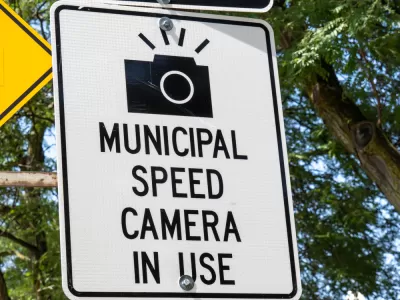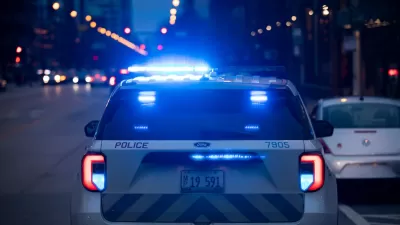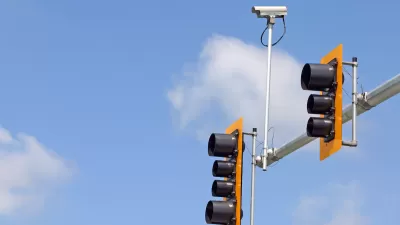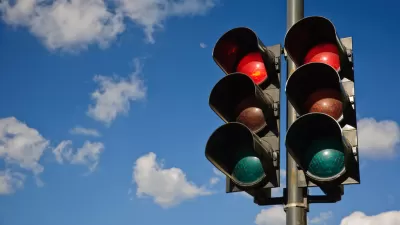There might be good reasons to oppose speed cameras and red light cameras—but racial justice is not one of them.

Historically, American cities have relied on the police to enforce traffic laws. But police enforcement of traffic laws doesn’t always work very well, for the simple reason that even if the police are motivated to stop speeding, they cannot be everywhere. Moreover, police enforcement has an important negative side effect: sometimes police officers get trigger-happy and shoot innocent citizens. And when the public perceives this trigger-happiness to be a result of racial bias, public respect for the police deteriorates, which leads to race riots and (sometimes) escalating crime rates.
One possible solution to this problem is “safety cameras”—automated cameras that ensure that drivers who drive faster that the speed limit or who run red lights would get tickets by mail. This procedure would reduce the need for police enforcement, which means that fewer motorists will be shot by police. And if safety cameras are common enough and effective enough,* drivers will speed less and kill fewer people.
However, some people try to wokewash the status quo, by claiming that speed cameras are more likely to be used in black neighborhoods, and thus implying that speed cameras victimize Black people. This argument is wrongheaded for three reasons. First, drivers in Black neighborhoods are not necessarily Black; they might be white drivers coming from white suburbs. For example, in Buffalo, the East Side of the city is heavily Black, but it adjoins Cheektowaga, which is 81 percent white—and the suburbs east of Cheektowaga are whiter still. So if the East Side’s major intersections had speed cameras, many white drivers as well as Black drivers would be ticketed.
Second, if drivers in Black neighborhoods are Black, walkers in those neighborhoods are probably Black as well. So if safety cameras reduce car/pedestrian crashes, they are saving Black lives. Compared to traffic enforcement by police, safety cameras would lead to fewer dead Black motorists, and would (if effective) lead to fewer dead Black walkers as well. Thus, the status quo only makes sense if you believe that protecting the pocketbooks of careless motorists is more important than protecting the lives of both motorists and walkers.
Third, a recent study shows that safety cameras are in fact more popular among Black (and Hispanic) folks than among whites. The primary purpose of this study was to show that “an interpersonal racial justice frame increases stated support for cameras”—that is, that people were more likely to support safety cameras when pollsters suggested that cameras were likely to reduce racial bias in policing. But even among the control group (that is, the group that was asked about cameras without the “racial justice frame”)** most people, especially Blacks and Hispanics, were pro-camera. In particular, among the control group 68 percent of Blacks and 64 percent of Hispanics supported cameras, as opposed to 49 percent of Whites. (Among the “racial justice frame” respondents those percentages rose to 86, 88 and 66 percent respectively).
In sum, there might be technical reasons to oppose safety cameras—but racial justice isn’t one of them.
*One problem with automated enforcement is, of course, that not every intersection has a camera. Also, drivers who are determined to evade the law can do so by illegally covering up license plates.
**The control group was given the following question: “Some people suggest using traffic safety cameras on neighborhood and arterial streets. Cameras would be placed at dangerous intersections and along roadways with many crashes. Drivers who drive much faster than the speed limit or who run a red light would get a ticket by mail. The cameras would run 24-hours a day. Based on the previous description, would you vote to approve traffic safety cameras in your community?” This wording seems somewhat biased to me, because it emphasizes the benefits of speed cameras; however, I see no reason why this would increase positive responses among Black respondents more than it would increase positive responses among other groups.

Maui's Vacation Rental Debate Turns Ugly
Verbal attacks, misinformation campaigns and fistfights plague a high-stakes debate to convert thousands of vacation rentals into long-term housing.

Planetizen Federal Action Tracker
A weekly monitor of how Trump’s orders and actions are impacting planners and planning in America.

In Urban Planning, AI Prompting Could be the New Design Thinking
Creativity has long been key to great urban design. What if we see AI as our new creative partner?

King County Supportive Housing Program Offers Hope for Unhoused Residents
The county is taking a ‘Housing First’ approach that prioritizes getting people into housing, then offering wraparound supportive services.

Researchers Use AI to Get Clearer Picture of US Housing
Analysts are using artificial intelligence to supercharge their research by allowing them to comb through data faster. Though these AI tools can be error prone, they save time and housing researchers are optimistic about the future.

Making Shared Micromobility More Inclusive
Cities and shared mobility system operators can do more to include people with disabilities in planning and operations, per a new report.
Urban Design for Planners 1: Software Tools
This six-course series explores essential urban design concepts using open source software and equips planners with the tools they need to participate fully in the urban design process.
Planning for Universal Design
Learn the tools for implementing Universal Design in planning regulations.
planning NEXT
Appalachian Highlands Housing Partners
Mpact (founded as Rail~Volution)
City of Camden Redevelopment Agency
City of Astoria
City of Portland
City of Laramie






























